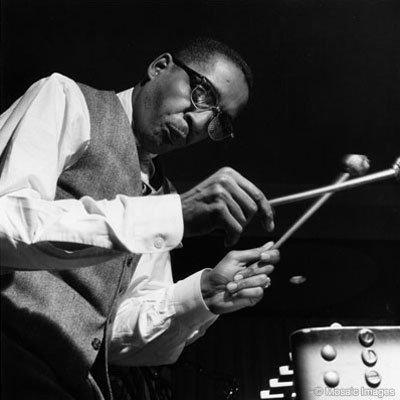Milt Jackson (Milton Jackson)

Milt Jackson was born on January 1, 1923 in Detroit, Michigan, the son of Manley Jackson and Lillie Beaty Jackson. Like many, he was surrounded by music from an early age, particularly that of religious meetings: “Everyone wants to know where I got that funky style. Well, it came from church. The music I heard was open, relaxed, impromptu soul music” (quoted in Nat Hentoff’s liner notes to Plenty, Plenty Soul). He started on guitar when he was seven, then on piano at 11. While attending Miller High School, he played drums in addition to timpani and violin and also sang in the choir. At 16, he sang professionally in a local touring gospel quartet called the Evangelist Singers. Jackson also took up the vibraphone at 16 after hearing Lionel Hampton play the instrument in Benny Goodman’s band. Jackson was discovered by Dizzy Gillespie, who hired him for his sextet in 1945, then his larger ensembles. Jackson quickly acquired experience working with the most important figures in jazz of the era, including Woody Herman, Howard McGhee, Thelonious Monk, and Charlie Parker. In the Gillespie big band, Jackson fell into a pattern that led to the founding of the Modern Jazz Quartet: Gillespie maintained a former swing tradition of a small group within a big band, and his included Milt Jackson, pianist John Lewis, bassist Ray Brown, and drummer Kenny Clarke (considered a pioneer of the ride cymbal timekeeping that became the signature for bop and most jazz to follow) while the brass and reeds took breaks. When they decided to become a working group in their own right, around 1950, the foursome was known at first as the Milt Jackson Quartet, becoming the Modern Jazz Quartet (MJQ) in 1952. By that time Percy Heath had replaced Ray Brown.
Known at first for featuring Jackson’s blues-heavy improvisations almost exclusively, in time the group came to split the difference between these and Lewis’s more ambitious musical ideas (Lewis had become the group’s musical director by 1955, the year Clarke departed in favour of Connie Kay), boiling the quartet down to a chamber jazz style that highlighted the lyrical tension between Lewis’s mannered, but roomy, compositions and Jackson’s unapologetic swing. The MJQ had a long independent career of some twenty years until disbanding in 1974, when Jackson split with Lewis, partly in an attempt to make more money on his own and, more likely, because he sought the improvisational freedom he once enjoyed. The group reformed in 1981, however, and continued until 1993, after which Jackson toured alone, performing in various small combos, although agreeing to periodic MJQ reunions. From the mid-1970s to the mid-1980s, Jackson recorded for Norman Granz’s Pablo Records, including Jackson, Johnson, Brown & Company (1983), featuring Jackson with J. J. Johnson on trombone, Ray Brown on bass, backed by Tom Ranier on piano, guitarist John Collins, and drummer Roy McCurdy. Milt Jackson was a guest on recordings by many leading jazz, blues, and soul artists, such as B.B. King, John Coltrane, Wes Montgomery, and Ray Charles. Jackson’s composition “Bags’ Groove” is a jazz standard (“Bags” was a nickname given to him by a bass player in Detroit. “Bags” referred to the bags under his eyes from his habit of staying up all night.[citation needed]) He was featured on the NPR radio program Jazz Profiles. Some of his other signature compositions include “The Late, Late Blues” (for his album with Coltrane, Bags & Trane), “Bluesology” (an MJQ staple), and “Bags & Trane”. Milt Jackson was a resident of Teaneck, New Jersey. He died of liver cancer on October 9, 1999, aged 76, and was interred at Woodlawn Cemetery, The Bronx, New York City.
Born
- January, 01, 1923
- USA
- Detroit, Michigan
Died
- October, 09, 1999
- USA
- New York, New York
Cause of Death
- liver cancer
Cemetery
- Woodlawn Cemetery
- Bronx, New York
- USA



